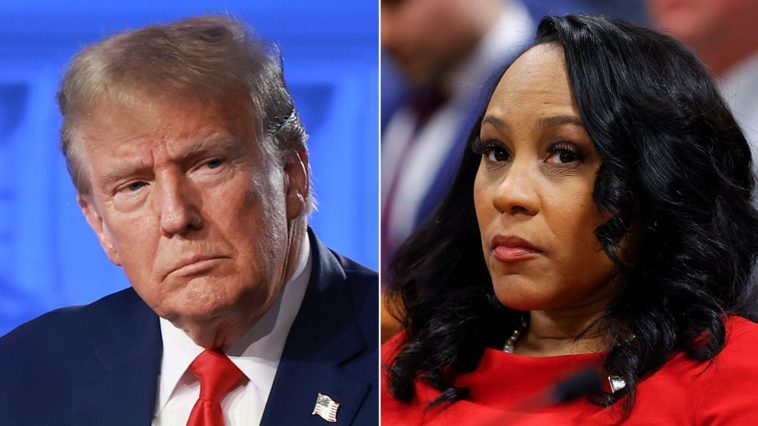In a new development that could tip the scales, Fani Willis, the under-fire District Attorney for Fulton County, finds herself thrust into a new skirmish over her role in the RICO case filed against the former U.S. President Donald Trump and other key players revolving around events following the 2020 Georgia elections.
Prominent personalities involved alongside Trump are his past chief of staff Mark Meadows, Rudy Giuliani, the former President’s ex-personal attorney, and associates Cathy Latham and Michael Roman. These co-defendants are challenging a questionable verdict by Fulton County Superior Court judge Scott McAfee made over a month ago that enabled Willis to maintain control over the case, despite the departure of the former special prosecutor Nathan Wade.
What’s at the heart of the matter is Willis’ relationship with Wade and additional measures taken regarding the case’s prosecution, all of which, claim the defendants, undermine her position. These concerns have led ex-DeKalb County District Attorney Robert James to urge a thorough probe of the case by the appeals court, underlining a paucity of legal precedence in this scenario.
Describing the situation as ‘uncharted territory,’ James further forecasts a lengthy review process in the offing, with a resolution not likely to emerge before November’s elections. In the meantime, four involved parties – bail bondsman Scott Hall and attorneys Sidney Powell, Kenneth Chesebro, and Jenna Ellis – have admitted to charges, whereas the remaining defendants, including Trump himself, have refuted any misconduct and entered not-guilty pleas.
Last month provided a significant move when the appeals court consented to examine Trump’s case and granted him a ten-day window to file. Trump’s legal representative, Steve Sadow, cast the issue as an opportunity for the former President to put forth compelling arguments for both the dismissal of the case and the disqualification of Willis due to her ‘improper conduct in this unjustified, unwarranted political persecution.’
The issue of impropriety was acknowledged by McAfee, who expressed concerns that the personal ties between Willis and Wade might affect the case. Following this, confirmation came from Willis’ office that she had accepted Wade’s resignation. McAfee subsequently approved an immediate review certificate, allowing Trump and eight additional co-defendants to appeal his decision to retain Willis for the case.
Upon decision to keep Willis on the case, McAfee’s action choreographed a 45-day period during which the appeals court could decide to entertain an appeal. Lawyers for Trump and other defendants then lodged a request with the appeals court to challenge McAfee’s ruling.
The association of co-defendants, labeled ‘The Fulton 19,’ are of the view that Willis’ numerous conflicts of interest should result in her removal from the case. They posit that this could be instrumental in attaining their release – an aspect highlighted in a report by The Federalist.
A significant legal obstacle stems from Harrison Floyd, a former Trump campaign staffer and one of the 19 defendants. Represented by attorney Chris Kachouroff, Floyd centers his objections around issues of jurisdiction. Specifically, he puts forth that the state’s election board should hold primary jurisdiction over election-related violations, not the office of Willis.
Further allegations from Floyd’s legal team suggest that Willis overstepped her boundaries by pursuing the indictments, which could lead to disjointed or repetitive prosecutions. If the Georgia Court of Appeals or the Georgia Supreme Court were to rule in favor of Floyd, it would indicate that Willis brought the indictments against the defendants without the necessary jurisdiction.
In the event of such a ruling in favor of Floyd, the repercussions could be far reaching and severely damage Willis’ case, causing it to ‘collapse like a house of cards.’ Moreover, it could strip Willis of any legal immunity protection, potentially making her and Fulton County susceptible to extensive civil rights lawsuits by the defendants, as suggested by The Federalist.
In a parallel development, Republican Missouri Attorney General Bailey indicated his intent to submit a Freedom of Information Act request to the Department of Justice. The request seeks to bring to light any ‘activity and/or communications’ between various parties including Manhattan District Attorney Alvin Bragg, New York Attorney General Letitia James, Special Prosecutor Jack Smith or Fulton County District Attorney Fani Willis that pertain to the investigation or prosecution.
These dynamic developments highlight transparency and conflict of interest concerns in the U.S legal system, especially when in relation to politically charged cases. They also underscore the uncertainties and complexities of such proceedings, illustrating how different interpretations of legal jurisdictions could potentially impact the outcomes.
As such, it is critical that the responsible institutions, like the Georgia Court of Appeals and the Georgia Supreme Court consider these nuances carefully and deliver rulings that uphold the rule of law and public trust. As observers, we recognize the significance of these issues and the broad implications they will have for justice, political authority, and trust in the democratic processes.
In nutshell, the Fulton County saga is far from over, and as the courtroom battles rage on, they continue to underscore the pivotal role our justice system plays in navigating the thorny issues of political power, electoral integrity, and the vital necessity of impartial judiciary.


